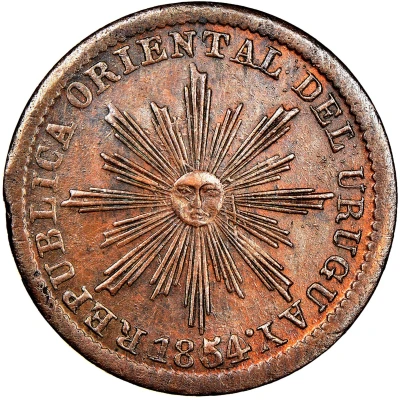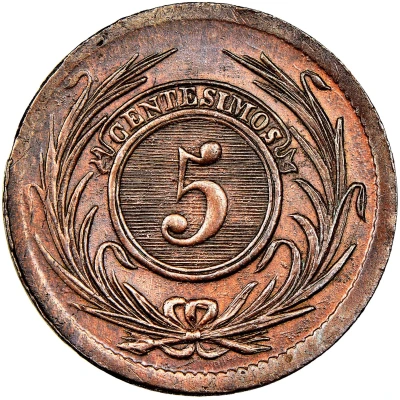


5 Centésimos de Real
| Copper | 6.8 g | 24 mm |
| Issuer | Uruguay |
|---|---|
| Period | Oriental Republic of Uruguay (1825-date) |
| Type | Standard circulation coin |
| Years | 1840-1854 |
| Value | 5 Centésimos (1⁄160) |
| Currency | Peso fuerte (1830-1862) |
| Composition | Copper |
| Weight | 6.8 g |
| Diameter | 24 mm |
| Thickness | 1.53 mm |
| Shape | Round |
| Technique | Milled |
| Orientation | Variable alignment ↺ |
| Demonetized | 14 July 1902 |
| Updated | 2024-10-09 |
| Numista | N#41604 |
|---|---|
| Rarity index | 75% |
Reverse
Value in a circle, sorrounded with two wreaths.
Script: Latin
Lettering:
CENTESIMOS
5
Engraver: Agustin Jouve
Edge
Smooth
Liso
Comment
First Uruguayan coins were minted at Montevideo on 1840 to 1855. After that date no more coins were minted in the country.
Since the mintage was done in a nearly hand-crafted way, there are several variants on each year; they were catalogued by Marcos Silvera Antunez, but not described in main catalogues.
Year list shows the variants, identified with Silvera's number (SA) he uses 3 levels instead of 2, first is the coin number (different on each year), the second is the variant, and the third describes the alignment (1= coin; 2= medal; 3= 90º or 270º, and 4=rest of alignments). Same structure was also used by the new Catálogo General de Monedas del Uruguay, but using letters instead of numbers for the rotation identification.
Mintage is estimated, because there is not a record of the quantities issued, and only a small amount of the original contract were issued.
Variants
1840 (SA# 1 / CG# 1)
On 1840, there are 4 variants, results of combinations of 2 different obverse (A1, A2), 3 reverse (R1, R2, R3) and alignment.
Obverses 1840
Differences on position of rays with relation to lettering; "teardrop" under "8" only on variant 1.1.2
Reverses 1840
Differences 1. left point of tie short and open (R1), long (R2), short and closed (R3)
2. leave close to right point of ribbon (R1), far to ribbon (R2 and R3)
3. leaves on right are closer (R1), separated (R2 and R3)
1844 (SA# 4 / CG# 4)
On 1844, there are 3 variants, results of combinations of 3 different obverse (A1, A2, A3), 2 reverse (R1, R2) and alignment.
Obverses 1844
Differences on position of rays with relation to lettering
NOTE: there are also coins minted with broken die on 4.1.2 and 4.3.1
Reverses 1844
Differences 1. straight leave (R1), curved leave (R2)
2. long tie end (R1) short tie end (R2)
3. missing reeding on center (only R2)
1854 (SA# 8 / CG# 8)
On 1854, there are 4 variants, results of combinations of 2 different obverse (A1, A2), 2 reverse (R1, R2) and alignment.
Obverses 1854
Diference on position of leftmost ray with relation to lettering
Reverses 1854
Difference is 2 leaves above tie (R1) and 1 leaf above tie (R2)
NOTE: there are also coin minted with broken die on 8.1.1
Images courtesy of Marcos Silvera Antúnez
Interesting fact
The 5 Centésimos de Real coin from Uruguay, made of Copper and weighing 6.8 grams, is interesting because it was minted during a time of great economic and political change in the country. The coin was introduced in 1840, just a few years after Uruguay declared its independence from Argentina and Brazil, and it remained in circulation until 1854. During this period, Uruguay was undergoing rapid modernization and industrialization, and the coin reflects this change, as it features a modern, standardized design that was meant to simplify trade and commerce. Despite its relatively short time in circulation, the 5 Centésimos de Real coin remains a valuable collector's item and a piece of Uruguay's rich history.
Price
| Date | Mintage | VG | F | VF | XF | AU | UNC |
|---|---|---|---|---|---|---|---|
| 1840 | 6000 | - | - | - | - | - | - |
| 1844 | 6000 | - | - | - | - | - | - |
| 1854 | 120000 | - | - | - | - | - | - |
Values in the table are based on evaluations by sales realized on Internet platforms. They serve as an indication only for 5 Centésimos de Real 1840-1854 coin.